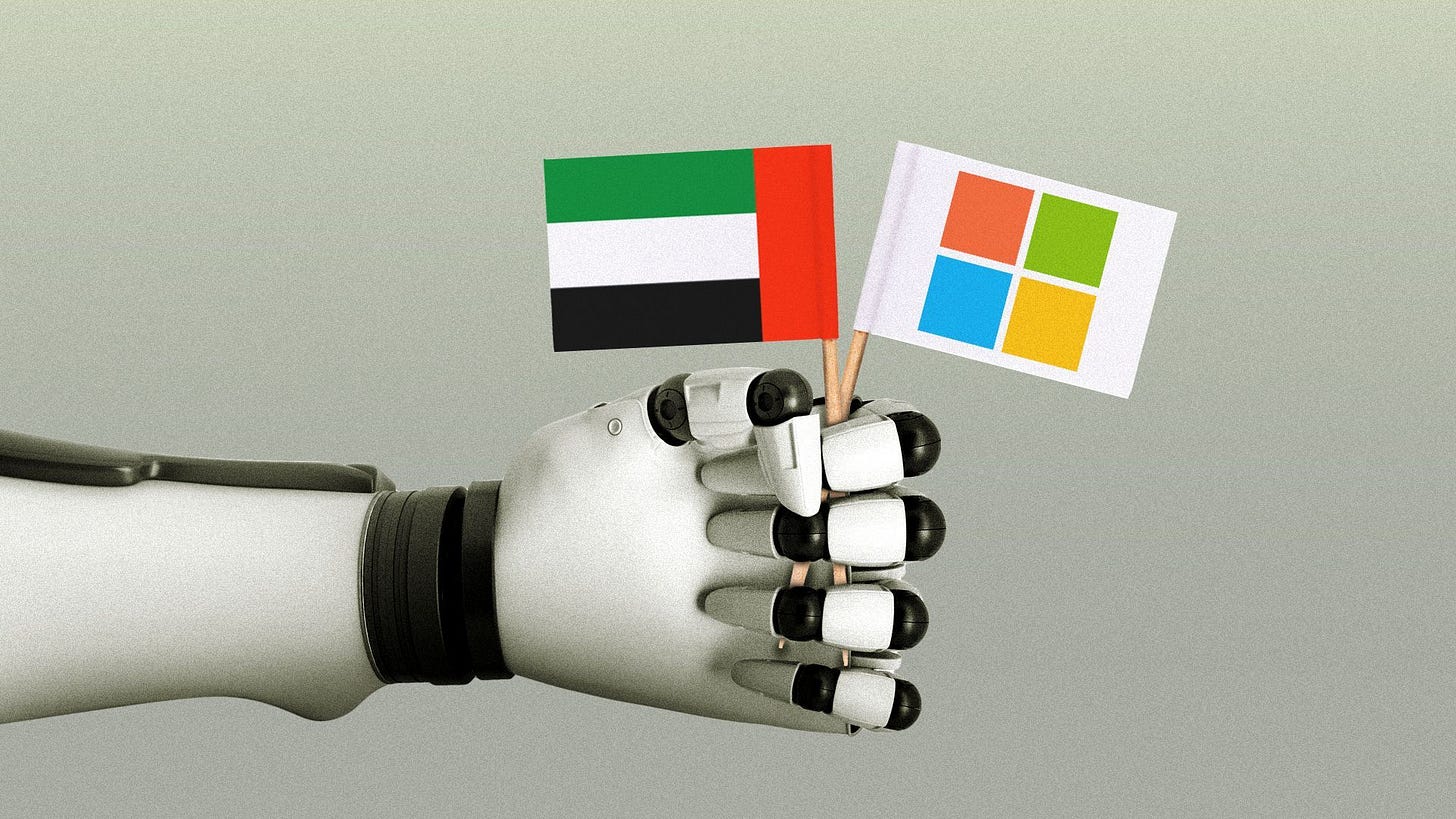
AI: Saudi Crown Prince MBS's AI Tech Focus on US visit. RTZ #914
The Bigger Picture, Sunday, November 23, 2025
The importance of the Middle East to this AI Tech Wave over the last few years has been well documented here in detail at AI: RTZ. It’s also of personal interest given that I grew up in Kuwait, and built Goldman Sachs’ presence in the region like Saudi Arabia, the UAE, and others in the 1980s. At the Sovereign Fund and Family Office fronts.
And the Mideast interactions for US/AI tech all accelerated further this past week when the Crown Prince of Saudi Arabia (aks ‘MBS’) got a State level reception at the White House in the Trump Administration.
Most of the big tech leadership were there for the meet and greet, including Elon Musk, Jensen Huang and Tim Cook amongst others. And that is all the more reason to take another look at the Bigger Picture context for AI industry and investments going into next year and beyond.
Axios covers this landscape well in “Why the Middle East is a hub for AI investment”:
“The Middle East is fast becoming not just a deep-pocketed investor in AI but a hot spot for data centers, highlighted by a new wave of Saudi deals announced Wednesday.”
“Why it matters: Allowing these deals is part of a strategic effort to ensure Saudi Arabia and other countries in the Middle East adopt U.S. technology rather than AI systems from China.”
And a lot of US tech companies were on hand for the deal-fest in progress:
“Driving the news: Tech companies used Wednesday’s U.S.-Saudi Investment Forum and this week’s D.C. visit of Crown Prince Mohammed bin Salman to announce a host of new projects with Humain — a Saudi AI and infrastructure developer backed by the country’s Public Investment Fund.”
“xAI: Elon Musk’s company has signed a “framework agreement” to build low-cost GPU data centers with Humain in Saudi Arabia and deploy Grok models throughout the country.”
“AMD and Cisco: Humain is working jointly with AMD and Cisco to deliver up to 1 gigawatt of AI infrastructure by 2030.”
“Nvidia: Humain will deploy up to 600,000 Nvidia GPUs across Saudi Arabia and the U.S. over three years, including work focused on physical AI as well as Arabic language AI.”
“Qualcomm: The chip maker is making a renewed push for a role in data centers, and its work with Humain is a key piece. On Wednesday Qualcomm said it will create an AI engineering center with Humain in Riyadh as part of a broader partnership to deploy 200 megawatts of data center capacity.”
“Amazon Web Services: Humain and AWS will deploy up to 150,000 AI accelerators for an “AI Zone” in Riyadh.”
“Adobe: Humain is working with Adobe to create culturally aware AI models, particularly for Arabic speakers, making use of Qualcomm’s data center products.”
Part of the draw is of course energy in the region.
“Between the lines: The region’s significant energy capacity is a huge draw for U.S. companies looking to rapidly build out AI infrastructure.”
“Given constraints on U.S. energy supplies that are likely to create serious bottlenecks in domestic AI data center buildouts, the Middle East has emerged as a key technology hub that will help bridge a 3-5 year period when US energy supplies are likely to be significantly constrained,” Paul Triolo, partner and global AI policy lead at business diplomacy consultancy Albright Stonebridge Group, told Axios.”
Also a draw of course is the hundreds of billions in potential investment capital. As well as of course pulling the mideast away from China:
“The other side: Saudi Arabia, like the United Arab Emirates, is trying to diversify its economy beyond fossil fuels.”The Saudi government last year targeted $40 billion in AI investments as part of its Vision 2030 plan, while the UAE has been backing its homegrown G42 effort. The G42 project initially had ties to China, but more recently has shifted to partnerships with U.S. companies, including Microsoft and OpenAI.”
“Both countries are investing massively in AI and looking to use their deep pockets and ability to rapidly build new electrical infrastructure to attract a major share of the booming market in AI data center construction,” Greg Allen, senior adviser at the Center for Strategic and International Studies’ Wadhwani AI Center policy think tank, told Axios.”
The ongoing concerns of course circle how secure are these tech investments in the region. For big US tech companies like Microsoft, Nvidia, OpenAI and beyond:
“Yes, but: The U.S. is expected to impose strict controls to ensure AI hardware sold in the region doesn’t reach China or Russia, Triolo said.”
“Some China hawks still worry that these massive Middle East deals could pose a risk.”
“Meanwhile, Triolo said the issue is also sensitive for both the UAE and Saudi Arabia, which both maintain close ties to Beijing and rely on telecommunications infrastructure built by Huawei and other Chinese firms.”
“The bottom line: With tens of billions flowing into AI infrastructure, the Middle East is emerging as a critical bridge and a geopolitical test for U.S. tech companies.”
The Mideast is likely going to be a focal point for US AI technologies and data centers for years to come. But the Bigger Picture is continuing the understand the fluid pros and cons from a geopolitical perspective in the AI Tech Wave ahead. Stay tuned.
(NOTE: The discussions here are for information purposes only, and not meant as investment advice at any time. Thanks for joining us here)









